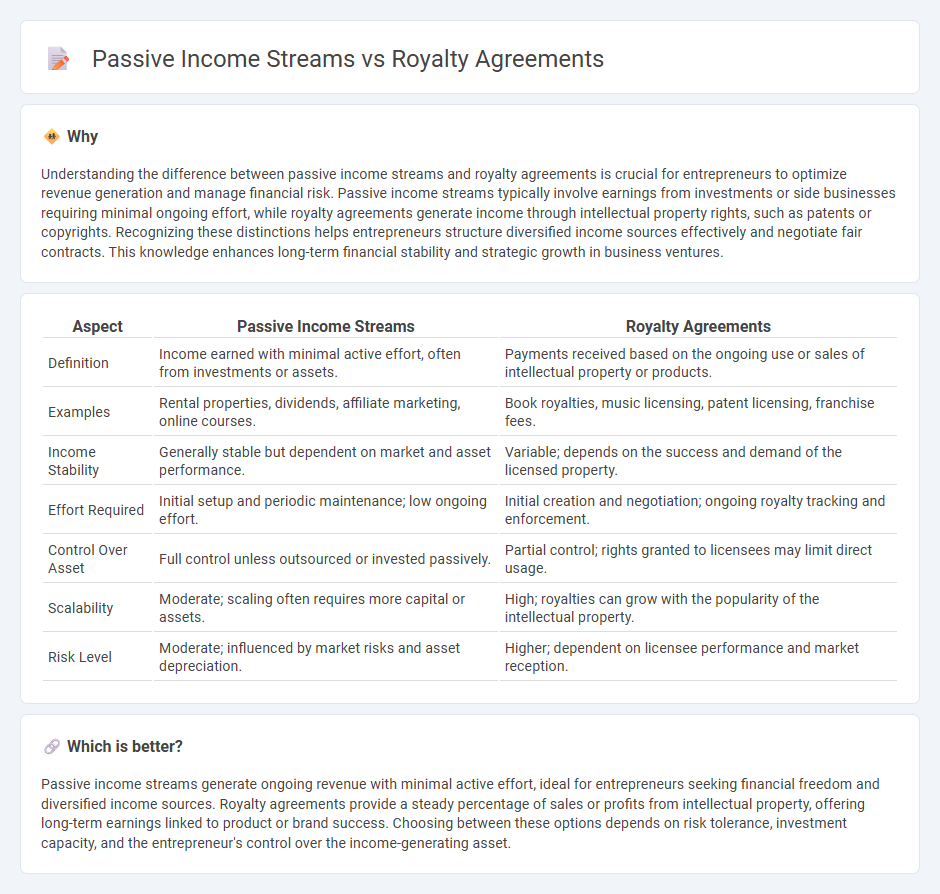
Entrepreneurship offers diverse avenues for generating income, including passive income streams and royalty agreements, each with unique financial benefits. Passive income streams allow entrepreneurs to earn recurring revenue with minimal ongoing effort, while royalty agreements provide payments based on the usage or sales of intellectual property. Explore the differences and advantages of these financial strategies to optimize your entrepreneurial earnings.
Why it is important
Understanding the difference between passive income streams and royalty agreements is crucial for entrepreneurs to optimize revenue generation and manage financial risk. Passive income streams typically involve earnings from investments or side businesses requiring minimal ongoing effort, while royalty agreements generate income through intellectual property rights, such as patents or copyrights. Recognizing these distinctions helps entrepreneurs structure diversified income sources effectively and negotiate fair contracts. This knowledge enhances long-term financial stability and strategic growth in business ventures.
Comparison Table
| Aspect | Passive Income Streams | Royalty Agreements |
|---|---|---|
| Definition | Income earned with minimal active effort, often from investments or assets. | Payments received based on the ongoing use or sales of intellectual property or products. |
| Examples | Rental properties, dividends, affiliate marketing, online courses. | Book royalties, music licensing, patent licensing, franchise fees. |
| Income Stability | Generally stable but dependent on market and asset performance. | Variable; depends on the success and demand of the licensed property. |
| Effort Required | Initial setup and periodic maintenance; low ongoing effort. | Initial creation and negotiation; ongoing royalty tracking and enforcement. |
| Control Over Asset | Full control unless outsourced or invested passively. | Partial control; rights granted to licensees may limit direct usage. |
| Scalability | Moderate; scaling often requires more capital or assets. | High; royalties can grow with the popularity of the intellectual property. |
| Risk Level | Moderate; influenced by market risks and asset depreciation. | Higher; dependent on licensee performance and market reception. |
Which is better?
Passive income streams generate ongoing revenue with minimal active effort, ideal for entrepreneurs seeking financial freedom and diversified income sources. Royalty agreements provide a steady percentage of sales or profits from intellectual property, offering long-term earnings linked to product or brand success. Choosing between these options depends on risk tolerance, investment capacity, and the entrepreneur's control over the income-generating asset.
Connection
Passive income streams often stem from royalty agreements, where entrepreneurs earn recurring revenue by licensing intellectual property such as patents, trademarks, or creative works. These agreements generate steady cash flow without active involvement, enabling entrepreneurs to focus on scaling their businesses or developing new ventures. Leveraging royalty agreements effectively transforms intangible assets into sustainable passive income sources critical for long-term financial growth.
Key Terms
Licensing
Licensing agreements establish royalty payments as a revenue model, granting others permission to use intellectual property while the owner retains ownership rights. Passive income streams from licensing provide continuous earnings with minimal active management, generating cash flow through trademarks, patents, or copyrighted content. Explore how strategic licensing can maximize your income and protect your assets.
Residual Earnings
Royalty agreements generate residual earnings by providing ongoing payments whenever a product or intellectual property is used or sold, creating a steady cash flow dependent on asset performance. Passive income streams encompass diverse sources such as rental income, dividends, or online content monetization, offering varying degrees of residual earnings based on initial effort and market conditions. Explore detailed strategies to maximize residual earnings through effective royalty agreements and passive income opportunities.
Intellectual Property
Royalty agreements generate income by granting rights to use intellectual property such as patents, trademarks, or copyrights, often tied to product sales or licensing deals. Passive income streams from intellectual property can include royalties, licensing fees, or income from digital assets like e-books and music, offering ongoing revenue without active involvement. Explore how strategic management of intellectual property can maximize royalty agreements and diversify passive income streams for sustained financial growth.
Source and External Links
Royalty Contract Template - A royalty agreement is a legal contract that outlines parties involved, licensed property, royalty rates, payment terms, confidentiality, indemnification, and legal remedies, designed to protect intellectual property rights and ensure fair compensation for its use.
Royalty Agreement: What is it? Key Terms, ... - A royalty agreement grants a licensee rights to use a licensor's intellectual property with detailed terms including royalty payment calculations, license scope, reporting, audits, term and termination, confidentiality, and indemnification clauses.
What is Royalty Agreement? - Royalty agreements legally bind a licensor and licensee regarding the use of intellectual property, specifying rights, royalty calculations (often a percentage of revenue), duration, and minimum payments, facilitating creators' compensation while enabling business collaboration and innovation.
 dowidth.com
dowidth.com